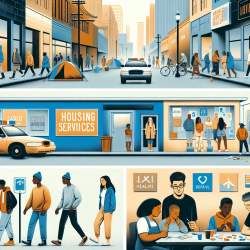Introduction
Homelessness among youth remains a pressing public health issue in the United States. Despite the critical need, youth experiencing homelessness (YEH) are often underserved, particularly in the context of comprehensive sexual and reproductive health (SRH) programs. A recent study titled "Opportunities and Challenges to Linkage to Housing in the Context of a Sexual and Reproductive Health Program for Youth Experiencing Homelessness" explores the potential of SRH programs to connect YEH with housing services. This blog delves into the findings of this study and offers practical insights for practitioners aiming to enhance their impact on this vulnerable population.
Understanding the Context
The study focuses on Wahine Talk, a comprehensive SRH program operating in Honolulu, Hawai'i. This program not only provides sexual health education and services but also addresses basic needs and offers linkages to housing services. The research highlights the dual challenges and opportunities inherent in leveraging SRH programs to facilitate housing connections for YEH.
Key Findings
The study identifies several critical factors that influence the success of linking YEH to housing services through SRH programs:
- Building Trust: Establishing trust between staff and youth is paramount. The presence of housing-specific staff and the ability to provide one-on-one time with youth are crucial in fostering this trust.
- Instrumental Support: Providing practical support such as cell phones, transportation, and drop-in hours can indirectly and directly facilitate housing linkages.
- System-Level Challenges: Local policies, such as restricted housing options for minors and police sweeps, can hinder the ability to connect youth with housing services.
Practical Implications for Practitioners
For practitioners working with YEH, the study offers several actionable insights:
- Employ Housing Specialists: Incorporating housing-specific staff within SRH programs can enhance the ability to connect youth with housing services.
- Enhance Communication Opportunities: Programs should provide ample opportunities for staff-youth interactions to facilitate discussions about housing needs.
- Focus on Reproductive Justice: Training staff to prioritize youth's reproductive choices can ensure that programs respect and support the individual needs and rights of the youth.
Encouraging Further Research
The study underscores the need for further research to explore the mechanisms through which SRH programs can effectively facilitate housing linkages. Understanding these dynamics can help refine program designs and improve outcomes for YEH.
Conclusion
Comprehensive SRH programs hold significant potential to address both the health and housing needs of YEH. By integrating housing linkages into these programs, practitioners can play a crucial role in improving the lives of homeless youth. For those interested in exploring this topic further, the original research paper provides a detailed exploration of the opportunities and challenges involved.
To read the original research paper, please follow this link: Opportunities and Challenges to Linkage to Housing in the Context of a Sexual and Reproductive Health Program for Youth Experiencing Homelessness.










